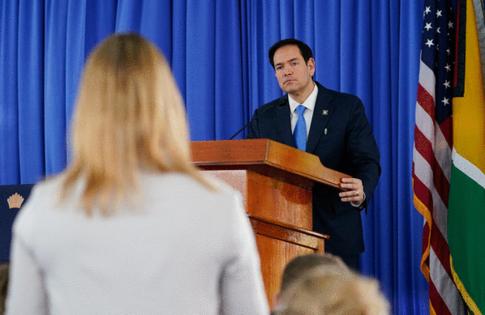'It would not end well': Rubio warns Venezuela against military action in Guyana
Published in Political News
Emphasizing the global reach of the U.S. Navy, Secretary of State Marco Rubio issued a stark warning Thursday to Venezuelan leader Nicolás Maduro, cautioning against any military aggression toward Guyana. Speaking alongside Guyanese President Irfaan Ali at a press conference in the capital of Georgetown, Rubio made it clear that Washington stands firmly behind its regional ally.
“It would be a very bad day for the Venezuelan regime if they attacked Guyana or ExxonMobil,” Rubio stated. “We have a large Navy, and it can reach almost anywhere in the world. And we have ongoing commitments to Guyana.”
Rubio’s visit to Georgetown on Thursday was part of a broader Caribbean tour aimed at strengthening U.S. ties in the region. He reaffirmed Washington’s support for Guyana’s sovereignty over the Essequibo region, a Florida-sized resource-rich territory that has been under Guyanese control since 1899 but is claimed by Venezuela.
Reacting from Venezuela, Maduro’s vice president, Delcy Rodriguez said that it is Guyana and the United States who are paving the way to an armed conflict in the region.
“The Caribbean Zelenskyy,” a term used by the regime to describe Guayan President Ali, “disdains holding talks… relying on warlike actions,” Rodríguez said through her Telegram account while accusing the president of Guyana of seeking Rubio out so they could threaten peace in the region.
“It must be made very clear, Venezuela will never give up its rights to Guyana Esequiba nor will it be intimidated by those enacting despicable acts against international law,” she added.
The Venezuelan regime, which blames Ukrainian President Volodymyr Zelenskyy for causing the war in Ukraine, has been accusing Ali of behaving like him in its propaganda against Guyana. The reference appears to be aimed at the United States, following the tense meeting between the Ukrainian president and President Donald Trump earlier this month at the White House. Experts suspect that the Caracas regime deliberately moved toward escalating tensions with Guyana to trigger a shift in U.S. policy toward Venezuela.
The border dispute between Guyana and Venezuela dates back more than 180 years but has sharply escalated in recent months. In December 2023, Maduro held a referendum seeking public approval to use military force to seize the Essequibo. His government claimed a 98% approval rate, despite widespread allegations of electoral fraud.
Since then, Maduro has repeatedly vowed on state television that Venezuela will not abandon its claim. His regime has since declared Essequibo as Venezuela’s newest state despite international objections, increased his country’s military presence near the border and announced plans to hold elections in the Essequibo region to install a governor.
Tensions reached a boiling point four weeks ago when a Venezuelan warship entered disputed waters, threatening ExxonMobil’s offshore operations in Guyana’s exclusive economic zone. The incursion triggered an immediate response from Washington.
“Venezuelan naval vessels threatening ExxonMobil’s floating production, storage, and offloading unit is unacceptable and a clear violation of Guyana’s internationally recognized maritime territory,” the U.S. State Department’s Bureau of Western Hemisphere Affairs posted on X. “Further provocation will result in consequences for the Maduro regime. The United States reaffirms its support for Guyana’s territorial integrity.”
Rubio reinforced the message in Georgetown, dismissing Venezuela’s claims as “illegitimate territorial ambitions of a drug-trafficking regime.” He warned that aggressive actions would carry serious repercussions.
“I want to be frank,” he said. “There will be consequences.”
_____
©2025 Miami Herald. Visit miamiherald.com. Distributed by Tribune Content Agency, LLC.




























































Comments